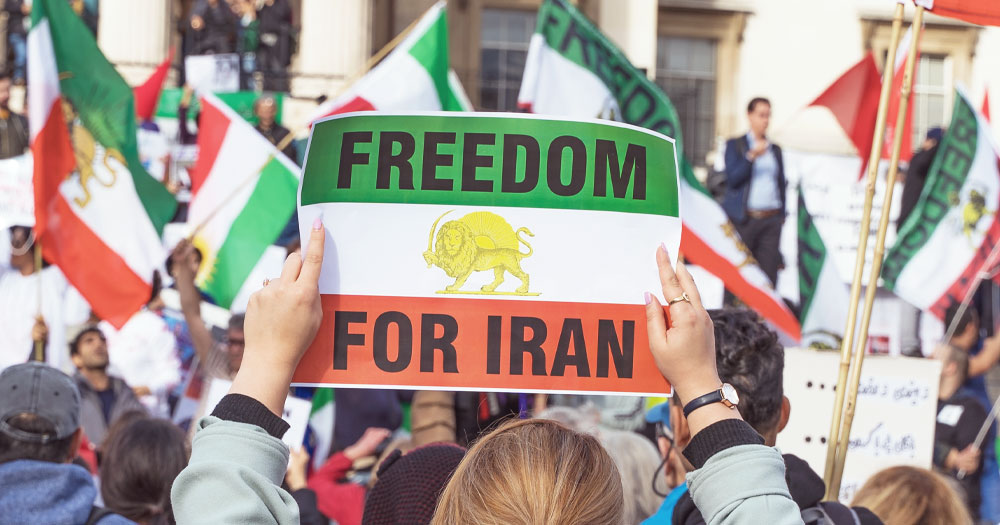Months after protests first broke out across the country, the women’s revolution is still ongoing in Iran. While many of those leading the revolution are brave women and girls, LGBTQ+ people in Iran are also fighting back against the oppressive regime of the Islamic Republic.
According to the BBC, LGBTQ+ protesters have taken to the streets in Iran carrying banners in the colours of the Pride and trans flags and placards with the slogan of the movement, “Woman, Life, Freedom”, as well as a modified version that reads, “Queer, Life, Freedom”. Activists have also found new ways to protest against the regime, like defying Iranian laws on same-sex intimacy by removing their hijab and kissing each other in public.
Images from the protests have also shown protesters spray-painting walls around the cities with pro-LGBTQ+ slogans such as “Queer, Trans, Freedom”, “The LGBTQ Community rises”, or “This is the voice of the LGBTQ community: liberation or setting the night on fire”. Flyers were also distributed with the message: “The Iranian LGBTQ family stands by you”.
The protests across Iran broke out last September, following the death of young ethnic Kurdish woman Mahsa Amini, who had been detained by morality police for allegedly wearing the hijab “improperly” and who died while in custody. News of her death provoked what has been dubbed the largest women’s revolution in Iran since 1979, when the Islamic regime was established in the country.
People took to the streets in several parts of the nation, protesting the regime’s violence and oppression. The Islamic Republic reacted harshly to the revolution.
According to the Human Rights Activists News Agency (HRANA), more than 530 protesters, including 71 children, have been killed by security forces in Iran since the beginning of the revolution.
Four men were executed for taking part in the protests, while many more were arrested and tortured in an attempt to suppress the movement. Dozens of prisoners are still at risk of execution. Moreover, many schools in Iran have recently been targeted by chemical attacks, with thousands of students being poisoned in what has been defined as an attempt to quash the wave of anti-regime unrest.
Unthinkable just months ago: a woman without a hijab, standing in the streets of Tehran, proudly holding up the LGBT flag. So brave. Our hearts are with the people of Iran. The harder the regime brutalises protesters, the more the Iranian people unite against it. pic.twitter.com/IhMijjNdKy
— LGBT Humanists (@LGBTHumanistsUK) November 16, 2022
Speaking to the BBC, a young Iranian bisexual woman and one of the activists who was arrested in connection with the revolution and later released on bail said that there was no surprise in the fact that the LGBTQ+ community was “more visible during the recent protests”, given that the movement “has roots in the struggle for human rights”.
In a recent speech in Tehran, Iranian President Ebrahim Raisin accused the West of “exploiting women” under the pretext of human rights. He then added that Western countries couldn’t “set norms for the world, since they are pushing humanity towards the brink of extinction by promoting immoral behaviour like homosexuality”, showing how the oppression of women and LGBTQ+ people are tightly linked in Iran.
Under Sharia law in Iran, same-sex relations are considered crimes that can carry the maximum penalty of death. Moreover, according to Harvard University researcher Afsaneh Rigor, LGBTQ+ people in Iran “are also criminalised in multiple ways, not only under oppressive laws generally criminalising freedom of expression on and offline, but also laws directly criminalising their identities”, with laws criminalising kissing or touching or wearing stereotypically female clothes if a person is assigned male at birth.
© 2023 GCN (Gay Community News). All rights reserved.
Support GCN
GCN is a free, vital resource for Ireland’s LGBTQ+ community since 1988.
GCN is a trading name of National LGBT Federation CLG, a registered charity - Charity Number: 20034580.
GCN relies on the generous support of the community and allies to sustain the crucial work that we do. Producing GCN is costly, and, in an industry which has been hugely impacted by rising costs, we need your support to help sustain and grow this vital resource.
Supporting GCN for as little as €1.99 per month will help us continue our work as Ireland’s free, independent LGBTQ+ media.
